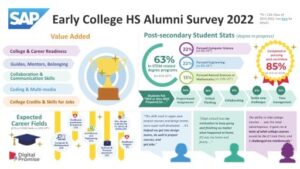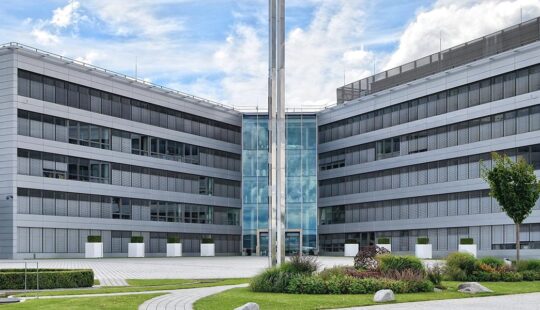Access to higher education is an invaluable gift – and one that is becoming increasingly important. From 2010 to 2019, the number of people in the U.S. with a bachelor’s degree has steadily increased – 7% in the last decade alone.
Yet, a pressing question remains: are people being left behind? Data shows that the rate of bachelor’s degree attainment among the U.S. White non-Hispanic population to be 42%. Meanwhile, for the Black and Hispanic population, this is at 28% and 20.6%. More specifically, looking at degree attainment among science and engineering shows that Hispanic and Black rates are at 15% and 8.5% compared to 58% for the White non-Hispanic population.
The Pathways
SAP not only acknowledged this gap a decade ago but took action, establishing the Early College High School program in 2013. Since its inception, this program has supported over 2,000 students from under-resourced and historically marginalized communities across North America. The goal of the program is to empower public schools to curate distinct educational programs centered around inclusion in STEM, postsecondary readiness, and workforce skill development.
What’s more, the program’s flexibility meets schools and educators where they are at. Currently implemented in four schools within the U.S. and Canada, the program is seen within a wide range of STEM and technical skills pathways, from Skyline High School in Oakland, California, which focuses on the arts and visual media, to the hands-on STEM incubator for students at Templeton High School in Vancouver, British Columbia. Specificity and customizability are some of the unique aspects of this larger umbrella of programs.
We’ve shared stories of the program’s impact on individuals, but are these one-off examples or are these programs truly impactful for the students? To find out, we worked with Digital Promise, a nonprofit focused on building equity through education and research, engaging current students, educators, and community members. Together, we set out to foster reconnection and survey alumni from the participating high schools.
The survey, created collaboratively by school community members and Digital Promise, was completed by 128 program alumni, accounting for approximately one-fifth of the graduating cohorts that the early college high schools decided to survey. It examined topics relating to alumni demographics, educational attainment, high school experiences and impact, and career intentions. Instead of forcing a one-size-fits-all program or survey, SAP and Digital Promise consistently worked to meet the varied and changing needs of the partnering schools.
The Findings

While it’s important to keep in mind that not all alumni responded to the survey, the results were incredibly promising and exceeded our expectations. Of the alumni who responded to the survey, 85% completed or are pursuing post-secondary degrees and 63% are in STEM-related degree programs. This contrasts starkly with the U.S. national average, where only 51% of adults had received post-secondary education and just 41% pursue STEM-related degrees.
This reveals significantly higher numbers of STEM majors within the program and an increased likelihood that students would pursue STEM and technical careers after graduation. Impressively, program alumni report expected careers in fields such as IT, engineering, computer science, healthcare, arts and design, and business and financial operations.
The Impact
In the survey, alumni highlighted the benefits of the program in preparing them for college and giving them access to early college credits, especially in STEM. One alumnus from Charlestown High School in Charlestown, Massachusetts, recounted that the program “gave me a taste of what college courses would be like if I took them, and it challenged me intellectually.” Likewise, at Business Technology Early College High School (or BTECH) in Queens, New York, alumni highlighted the benefits of the program preparing them for college, giving them access to college credits, communication skills, guides, mentors, and belonging. One former BTECH student explained that “Taking college classes early in high school has helped me bypass several classes in my bachelor’s degree program. The program…challenged me a lot and helped me improve my writing and communication skills. I loved this early college program and wouldn’t choose anything else if I had to go back again.”
These programs gave many students unprecedented access to sophisticated STEM educational pathways and opportunities for experiential learning in science and technology. At Templeton Secondary School, the program serves as an incubator for early STEM and tech talent by giving students hands-on experience with science experiments, lab work, and creative problem-solving. One Templeton alumni highlighted the sophistication of Templeton’s STEM preparedness programs, stating, “[In college] I am often the only one that has used tools and machines and worked in a self-taught environment, and it’s helped me get into design teams, do well in project courses, and get jobs.”
Similarly, students at Skyline High School echoed the aforementioned benefits of college credits, career exposure, and even coding. In addition to providing pathways to STEM and professional development, Skyline’s program focuses on preparing students for careers in film and media. Alumni from this unique program spoke to the value of training in multimedia, professional software, and project management experience, explaining that “Working on a professional film set opened my eyes to the possibilities for my future career.”
The Future
As we work towards a more equitable society, connecting students and early talent with opportunity is essential. Our results reveal a wide range of diverse benefits from our Early College High School program. SAP hopes to continue working with Digital Promise to build out an alumni database for the program, expand survey offerings, and help other programs reconnect with their alumni. As our workforce continues to evolve, there is an ever-growing need to create inclusive educational pathways for all students to develop future skills, and gain access to a higher education. It is incumbent upon all of us to make sure all students are empowered and supported as they decide their path to the future.
Chelsey Lerdahl is part of SAP North America Corporate Social Responsibility.



